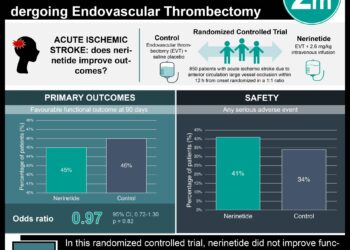Centralized stroke care linked to improved mortality and reduced length of stay
1. In this study, specialized inpatient care of stroke patients was linked to better clinical outcomes.
2. Centralization of stroke care was also linked to mortality and hospital stay reduction in London and Greater Manchester.
Evidence Rating Level: 2 (Good)
Study Rundown: Stroke is a major cause of morbidity and mortality worldwide. In the UK, there are and 125,000 new stroke patients and approximately 40,000 resultant deaths from stroke annually. Acute stroke care is challenging and resource intensive, but organized coordinated care from specialized and multidisciplinary teams has been proven to improve outcomes. In 2010, acute stroke care in England was centralized in two metropolitan areas – Greater Manchester, and London with unknown effects on outcomes. This study evaluated acute stroke admissions before and after centralization of care to quantify effects on mortality and length of stay. The study found that patients in London had a reduction in mortality at 3, 30, and 90 days after admission, in addition to a reduced length of hospital stay. In greater Manchester, there was no mortality benefit and only a length of stay benefit.
Strengths of this study include information gathered from a large national patient database and stratification of data to parse the results. The authors also evaluated risk adjusted outcomes, and for the first time since reorganization of care, reported on the effects of this change in practice. Weaknesses of the study include missing information on stroke severity, which is a well-established prognostic indicator in addition to lack of analysis of morbidities such as neurological functioning and quality of life of stroke patients. This demonstrates that a “hub and spoke” model of acute stroke care based on urban centers of care produces better clinical outcomes, adding to the current body of evidence supporting specialization of care. These findings may be used to improve existing stroke care models to design better and more cost effective strategies. In addition, the results can eventually help lead innovations in centralization of care in other fields such as cardiovascular, trauma, and cancer care.
Click to read the study, published in the BMJ
Relevant Reading: Impact on clinical and cost outcomes of a centralized approach to acute stroke care in London
In-Depth [retrospective cohort]: This study analyzed 258,915 stroke admissions from across the UK using quarterly analyses over a 51 month period from 2008 to 2012, before and after centralization of stroke care. The retrospective study focused on the two centralized stroke centers in the country, in Greater Manchester and London, and looked at deaths from any cause at 3, 30, and 90 days after presentation, in addition to total hospital stay. The logistical regression models used during the course of the study demonstrated mortality benefits all across the UK, reflective of improving standards of care, but these benefits were enhanced in the centralized care centers. London showed improved mortality at 3, 30, and 90 days, by -1.0, -1.3, -1.1 percentage points respectively (p<0.001), while Greater Manchester did not demonstrate such benefits. In terms of length of stay benefits, Manchester showed 9% reduction, resulting in 17,685 (CI95%, 10,717 to 24,652) fewer days of hospitalization while London demonstrated a 7% reduction, 22,341 fewer days (CI95%, 7,887 to 36,795). It is important to note that key differences between the two sites include acute care in Manchester being provided only to patients presenting within four hours of symptom development, compared to all patients in London, and evidence of greater compliance with care organized care procedures in London.
More from this author: Crowdsourcing picture based food ratings comparable to expert ratings, Shift work linked to increased risk of diabetes, Risk of cerebral palsy linked to relatedness to cerebral palsy patient
Image: PD
©2012-2014 2minutemedicine.com. All rights reserved. No works may be reproduced without expressed written consent from 2minutemedicine.com. Disclaimer: We present factual information directly from peer reviewed medical journals. No post should be construed as medical advice and is not intended as such by the authors, editors, staff or by 2minutemedicine.com. PLEASE SEE A HEALTHCARE PROVIDER IN YOUR AREA IF YOU SEEK MEDICAL ADVICE OF ANY SORT.







